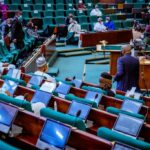The Socio-Economic Rights and Accountability Project, (SERAP) has asked the Independent Corrupt Practices and Other Related Offences Commission (ICPC) and the Economic and Financial Crimes Commission (EFCC) to investigate allegations that principal officers and members of the Nigerian Senate are using their official positions to get job slots from government agencies.
SERAP also urged the anti-corruption agencies to probe allegations that some Ministries, Departments and Agencies (MDAs) are selling the employment slots at their disposal, with a single slot being allegedly sold for as much as N1.5 million.
“We urge you to prosecute anyone suspected to be involved should you consider there is relevant and sufficient admissible evidence, and to make public the outcome of any investigation,” it said.
In the petition dated 18 October 2019 and signed by SERAP deputy director Kolawole Oluwadare, the organization said: “This alleged preferential treatment in Nigerians’ access to government jobs is a textbook case of cronyism, patronage and corruption.
“The public interests are best served when public employees are recruited on the basis of their skills, competence and expertise rather than as a reward for political, social and other similar connections.”
In the letter sent to ICPC chairman, Bolaji Owasanoye and EFCC Acting Chairman, Ibrahim Magu, SERAP said: “Unless the allegations are urgently investigated and suspected perpetrators brought to justice, the effective and efficient performance from the public workforce, competence in government services and functioning of ministries, department and agencies will continue to be negatively impacted.”
It added: “These allegations show the face of public recruitment in Nigeria in recent decades, which has typically been that of political influence, cronyism, patronage and corruption.
“The allegations amount to a fundamental breach of Nigerian Constitution 1999 (as amended), the country’s anti-corruption legislation and international obligations, particularly article 7 of the UN Convention against Corruption to which Nigeria is a state party.”

 Join Daily Trust WhatsApp Community For Quick Access To News and Happenings Around You.
Join Daily Trust WhatsApp Community For Quick Access To News and Happenings Around You.

